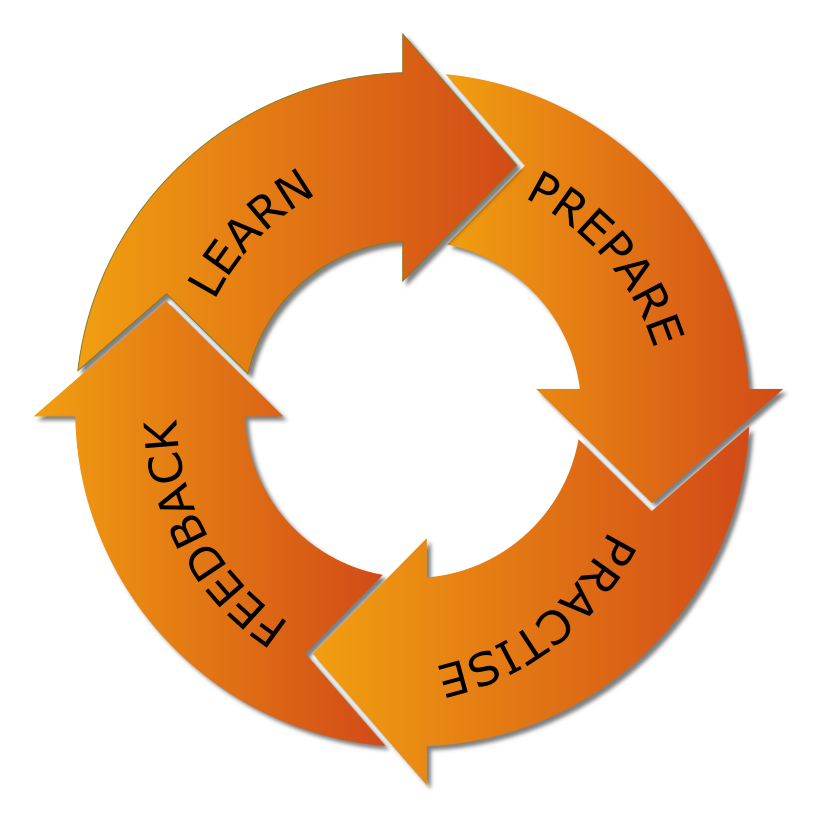Ok, enough theory. By now, you probably have the specific question, "once I join, how exactly do I learn and improve?"
Continuous improvement in club meetings
Agora club meetings are not "training sessions" or "seminars". There are no "experts" or "teachers" in an Agora Speakers club- everyone is there for their own learning process, everyone has something to learn and to improve, everyone is your peer and your equal.
The learning process happens using a very widely applied practice in the industry called "Continuous Improvement Cycle" and the "learn by doing" approach.
For each project, you will go through the following stages:

Learn
During the "Learn" phase of each project, you will:
- Study the online materials and resources for the project
- Analyze what other accomplished speakers and leaders do.
- Ask questions and get advice from our worldwide community.
- Engage with your mentor on the specific tasks of the project.
Prepare
Now that you've learned the theory, it's time to put it into practice. Regardless of the type of project - public speaking, critical thinking, leadership, or other, you will need to do it yourself. For that, you will need to prepare by:
- Writing speeches or plan leadership tasks according to project goals.
- Rehearse, rehearse, rehearse.
- Discuss and receive guidance from your mentor.
Practice
Now it's the time to practice what you've learned by presenting your project to the club. You will be:
- Delivering prepared speeches in your local club.
- Showing the results of your leadership projects.
- Practice all sorts of scenarios such as improvisational speaking, debating a subject, or being grilled with questions on a decision you've made.
- Taking leadership positions in clubs and higher levels in the Foundation.
- Spearheading and leading real-world projects that positively impact your community and improve the lives of people around you.
Get Evaluation and Feedback
After the project is presented, you'll:
- Receive detailed evaluation from your peers at club meetings.
- Receive written feedback from other club members.
- Receive general advice from the community
- You will write a journal where you will reflect on your path and learned lessons, and it will serve as both a history of your progress and a guide of where you need to improve.
The feedback that you receive will always be supportive and offered with the true intention to help you improve. Unlike real-world situations, no one will judge you or try to prove you wrong, or make you look bad in front of others. In fact, the supportiveness, friendliness, and warmth of our community, where we all learn and improve together, is one of the best things you'll find in Agora.
Repeat
Nobody becomes an expert on the first try, and you shouldn't expect to be able to play Chopin on your first day with a piano or score a hole-in-one on a golf course. The core to success is repeating, getting feedback, listening to others, and then moving forward. As the saying goes, "Practice makes perfect."
Our Educational Program does not have a time limit - you can proceed at your own pace, repeat a project as many times as you wish, and only move forward when you feel you're ready. Unlike most real-life scenarios, there's absolutely no penalty in Agora to try out a leadership or speaking technique and realize that it didn't work quite well. In fact, we encourage you to do that so that you're already prepared when the moment comes in real life where you do have to get it right.
Does this system work? Isn't a professional course better?
Research has shown that even moderate proficiency in a skill (be that tennis, dancing, swimming, or public speaking) requires practice, usually well beyond the number of hours devoted to practice in professional courses.
Consider this: Imagine you want to learn to cook great dishes. You have several options:
- Sign up for an intensive 1 or 2-week course with a famous chef, create some dishes one time, spend a lot of money, and hopefully, after that, you're already an expert.
- Join a cooking group. Every week, you'll be reading how to create a single dish from the online materials, and you will cook that dish for all members of your group. Everyone will taste it and give you their feedback. If you're satisfied, you can move to a different dish the following week. If not, you can repeat it. Each new dish you cook will be more and more complex. You do this "loop" week after week for several months, without spending any money. Additionally, in the cooking group, you'll practice different specific cooking skills.
- Alternatively, you can simply read a lot about cooking, watch a lot of videos, and trust that when the time comes to prepare something for your guests, you'll be ready.
Which approach do you think will be best?
Agora takes the second approach - you'll have access to our educational materials, crafted by professionals with the specific goal of taking you from the very basics of public speaking, leadership, and debating to more and more advanced concepts.
But don't trust our word for it. Record yourself, join a club for some time, re-record yourself, and you'll be amazed at how much you have progressed in such a short period of time.
Of course, you'll only improve if you attend meetings regularly and take roles in them. If you only go to your Agora club once a month, or even less frequently - you're wasting your time. It would be like trying to become a piano player or a dancer by playing or dancing once a month.
Workshops and Conventions
Both the Foundation and the clubs constantly organize workshops and conventions at all levels (city, country, international, etc.). Apart from the regular club meetings, you'll be able to enjoy many workshops, training sessions, and seminars delivered by experts in their fields.